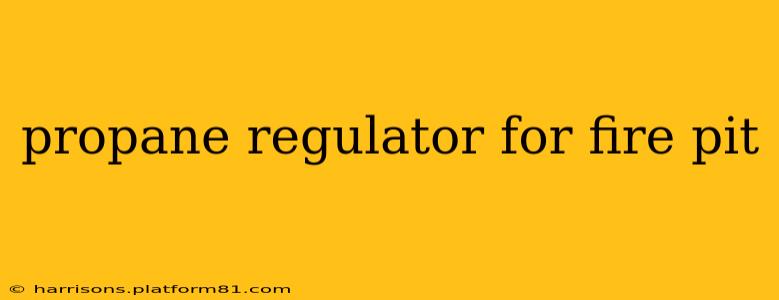Choosing the right propane regulator for your fire pit is crucial for safety and performance. A faulty regulator can lead to dangerous gas leaks or insufficient flame. This guide will help you understand the different types of regulators, their features, and how to select the best one for your needs. We'll also address some common questions surrounding propane fire pit regulators.
What type of propane regulator do I need for my fire pit?
The type of propane regulator you need depends on the BTU output of your fire pit. Most fire pits use low-pressure regulators, typically rated for 11 inches of water column (WC). Always check the manufacturer's specifications for your specific fire pit model to determine the correct regulator type and pressure rating. Using the wrong regulator can be dangerous. You'll find this information in the owner's manual or on the fire pit itself. Don't guess—verify!
What is the difference between high-pressure and low-pressure propane regulators?
-
High-Pressure Regulators: These reduce propane pressure from the tank (around 200 PSI) to a much higher intermediate pressure (often around 10-14 PSI). They are typically used for appliances requiring high gas flow rates, like large commercial grills or industrial equipment. They are not suitable for most residential fire pits.
-
Low-Pressure Regulators: These reduce propane pressure directly from the tank to a much lower pressure suitable for use with residential fire pits. This pressure is usually between 3.7 and 11 inches WC. These are the most common type for fire pits and provide a safer, more controlled flame.
How do I know what size propane regulator I need?
The size of your propane regulator is determined by the connection size at both ends. One end connects to the propane tank, and the other connects to the fire pit. Common connection sizes include 1/4" male pipe threads (for the tank) and 1/4" female pipe threads (for the fire pit), but variations exist. Consult your fire pit's manual to confirm the required connection sizes. Using incorrect fittings can cause leaks.
How often should I replace my propane regulator?
While there's no hard and fast rule for replacing a propane regulator, it's a good idea to inspect it regularly for damage, corrosion, or leaks. If you notice any cracks, dents, or signs of wear, replace the regulator immediately. Also, consider replacing it every few years as a preventative measure, especially if the regulator is frequently exposed to the elements. A worn-out or damaged regulator can be a significant safety hazard.
Can I use a different type of propane regulator on my fire pit?
Absolutely not. Using the wrong type of regulator can result in unsafe operating conditions and potentially dangerous gas leaks or explosions. Always use the type and pressure rating specified by your fire pit's manufacturer. Using the wrong regulator voids any warranty and risks your safety.
How do I know if my propane regulator is leaking?
A leaking propane regulator can be extremely dangerous. There are a few ways to check for leaks:
- Soap Test: Apply a soapy water solution to the connections. If bubbles form, you have a leak.
- Smell Test: Propane has a distinct odor added for safety. If you smell gas, even faintly, immediately turn off the propane tank and check all connections for leaks. Never use a flame to detect a leak.
If you detect a leak, immediately shut off the propane tank and contact a qualified technician for repair or replacement of the regulator. Never attempt to repair a propane regulator yourself unless you are a qualified technician.
What should I do if my propane regulator is malfunctioning?
If you suspect your propane regulator is malfunctioning (e.g., inconsistent flame, difficulty igniting, or unusual noises), immediately shut off the propane tank and contact a qualified technician. Don't attempt to diagnose or repair the regulator yourself; this is a job for a professional. Your safety is paramount.
Remember: safety is your top priority when using propane appliances. Always follow the manufacturer's instructions carefully, and don't hesitate to call a professional if you have any doubts or concerns about your propane fire pit regulator.
